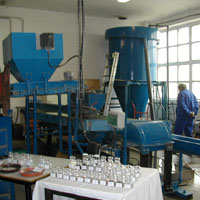Industry gives backing to ERC
The European Research Council (ERC), launched officially on 27 February in Berlin, will fund curiosity-driven research, with researchers competing on excellence for the awards. The launch was celebrated enthusiastically by researchers, but is that excitement shared by industry? Logically, industry is primarily interested in the other end of the research process - applied science and innovation. Industry's lobbying has focused on creating the right environment for companies to invest in research in Europe, and to then take products to the market. While Europe is good at producing research results, following these results through and producing a commercial product or service is a weakness frequently referred to as Europe's 'innovation paradox'. According to Helga Nowotny, ERC Vice President and Vice Chair of its Scientific Council, everyone should stop thinking in terms of a linear model. The process from idea to product does not follow a set path that starts with basic research; there is far more 'chance and serendipity' involved. The uncertainty inherent in curiosity-driven research offers tremendous potential, and industry should be fascinated by the opportunities that such research provides, said Professor Nowotny. She added that the ERC is open to industry to apply for funding, providing that the project involves curiosity-driven and not industrial research. 'It is not the ERC's job to solve the innovation problem,' said Mark Walport, Director of the Wellcome Trust in the UK, giving his support to the initiative and its objective of supporting curiosity-driven research. This view was supported by another eminent industry figure: Secretary General of the European Industrial Research Management Association (EIRMA), Andrew Dearing. He told CORDIS News that the ERC is 'interesting as a part of the whole picture of achieving the European Research Area' as Europe needs symbols that pull up research from the top. He added that the EU's framework programmes for research, while a 'super initiative', have focused on cooperation, which has now been addressed to a large extent. With the budget rightly increasing, it is now time to reassess the framework programmes' objectives, and to increase more of an element of competition. 'The ERC is the first wedge in the framework programme to ensure excellence,' said Mr Dearing. But while the ERC has Mr Dearing's full support, it will not solve all of Europe's research problems. The EU is very good at creating an environment that supports science, but not so good at creating an environment in which companies want to invest. 'One element is getting basic research right, but politicians mustn't now draw the conclusion that they've done their job because they've set things up,' he told CORDIS News. Mr Dearing suggested that EU policy-makers remember the Aho agenda, which recommends creating lead markets, improved rules on innovation and state aid, and protection for intellectual property rights, among other things. Asked whether the proposed European Institute for Technology (EIT) is perhaps the answer to some of these problems, Mr Dearing was cautiously optimistic. When EIRMA first heard about the proposals for an EIT they had concerns on two counts: that the project was being driven by a desire for a physical memento that would offer little in terms of practical support, and that the proposal's appearance at a time when the Seventh Framework Programme (FP7) discussions were at a crucial stage would detract from these discussions. 'But credit to DG Education and what they have done in the last year. They have listened to the stakeholders and realised that it's about concentrating the expertise that already exists,' said Mr Dearing. The EIT is of course a different animal to the ERC, as Mr Dearing points out. The ERC has clear specifications and has a group of highly qualified people in place in its Scientific Council. 'It is harder to see how to organise the EIT and how to get the right people into place to ensure it happens,' believes Mr Dearing.



